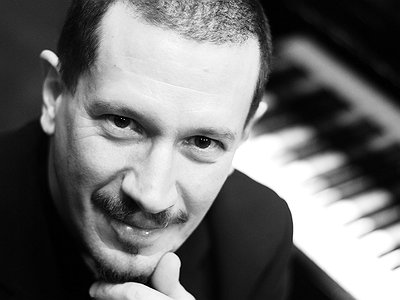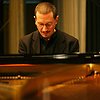WHY music?
To many, music is a refuge from life's turmoil, a safe chill-out-haven of stability. To Chris Jarrett, on the contrary, it is a representation of the true tendency of things to constantly mutate, transform and change. His own biography speaks books in this regard. Born into a musical family and drawn to the piano at an early age, it seemed only logical for Jarrett to sign up for studies at Oberlin Conservatory after finishing school. By this time, his elder brother Keith was already playing with some of the biggest names in jazz, and Chris seemed well on his way towards achieving similar success on the classical and new music scene. Instead, repulsed by what he considered an academic strangle hold on his artistic freedom, he embarked on what he now calls his 'wandering years' and which would take him not just on an adventurous journey, but also on a search for meaning and his own spot in life. He would find both in his current home base of Germany, eventually embarking on a career in music after all. This time, however, it was on his own terms. Today, Jarrett's work encompasses mind-blowingly virtuoso improvisations, grand-scale choral works, intimate piano meditations, excursions into jazz territory as well as an as yet unfinished opera. Although he has chosen to draw from as many different influences and styles as possible, neither superficial eclecticism nor demonstrative complexity are part of his aim. Not for nothing, Jarrett enjoys quoting the great Charles Mingus: "Anyone can make the simple complicated. Creativity is making the complicated simple."
When did you start playing your instrument, and what or who were your early passions or influences?
I was surrounded by music as a child. Listening to Keith practicing was a hobby of mine from the time I was a toddler. Keith noticed my preference for the classical stuff he was playing and tested me sometimes. “What do you like better, this (Beethoven), or this (Hardy)?” I replied that the first one seemed “sharp” and the latter “dull”, as in a blade. It was consistent – the classical music was sharp and the jazz was dull. I still love clear and pointed structures in music – lines and rhythms that intertwine and don't get soupy and cloudy. Besides, there was a small record collection at the Jarrett house – mostly cheap Acme records with unnamed symphony orchestras - and I began to love the more “exotic” composers like Rimsky-Korsakov or Khachaturian. No wonder, that I was able – decades later – to find my way into and enjoy Arabic and Turkish music without much difficulty. Soon it was Bartok who became my super-hero and then, at around 9, the moderns such as Penderecki, Henze or Stockhausen. I had a jazz phase in my puberty, but ended up giving all of my jazz records to the local library 2 years later.
What do you personally consider to be the incisive moments in your artistic work and/or career?
The most important change in my life, leading me to the career I have now was a non-musical one. I had already begun studies at Oberlin Conservatory, but was unable to go on due to the high costs – this in spite of a partial scholarship and continual jobbing. After quitting college, I was forced to look for work and began a trek to Texas per thumb. It was said, that in the cowboy State jobs were quick to find. I managed to get myself on a shrimp boat from Freeport with 2 black fishermen, who were totally surprised that I took up on their offer to work for them at all. In a way, it was this captain who opened sleeping reserves of empathy and understanding in me. This 7-fingered man supported me in my troubled and insecure situation and won my deepest respect. After deep-sea fishing, I went back on land for factory work and, in the end, found myself in an office in New York City. I guess, the shrimp boat was very incisive because it made me want to use my talents – which ever they might be – for a purpose. Since then I never tire of asking myself and others, “WHY music?” The next experience was the inclusive and creative way my friends and colleagues in North Germany (to which country I had immigrated) gave me opportunities to use and develop my music. I was finally out of my homeland – and felt much freer for it – at the beginning of the 80s. Without this decision, I would probably still be in a clothing store office.
Keith Rowe once asserted that it is often certain people that “give one permission to do things”. How was that for you – in which way did the work of particular artists before you “allow” you to take decisions which were vital for your creative development?
Yes, Keith Rowe is right. As I mentioned above, the people I was around in the city of Oldenburg in Germany were curious to hear what I had to say – musically and politically. My critical thoughts and feelings about the U.S. and my experiences there were expressed in my compositions at that time (“Jenson Drive,” “County Farm Basketball Match,” “Down South,” etc), and the people I was around were listening. More than this, they commissioned little compositions for political events or “happenings” and forced me to work quickly and efficiently. I was in the habit of finding so much fault in my compositions, that they never really got finished, and now I had to show my wares. In the end, I was writing ballets and film music and teaching at the university.
What are currently your main artistic challenges?
The main challenge at present is finding time to compose in peace and without the continual disturbances and burdens of the mundane. My greatest goal at present would be to be able to finish my opera “John Donne,” and get it staged. Besides this, my quartet “Four Free” is working on a new CD, and I would love to work more with my wife the pianist Martina Cukrov Jarrett. There are literally dozens of half-fulfilled projects ranging from chamber music to symphonic works to be finished when tranquillity sets in. By the way, I always wanted to conduct and never had the chance – still dreaming.
What do improvisation and composition mean to you and what, to you, are their respective merits?
Well, most compositions begin as improvisations of some kind anyway. I don't write my compositions down if I am the one to be playing them – but of course I compose for other pianists as well. Here is one difference already – when improvising you can do things you understand without tearing them apart and piecing them back together with all kinds of minuscule symbols which have to be explained anyway. But, besides this, improvisation has the advantage of mirroring the present in all its dynamic tension, and tension is the essence of the musical experience. I can thank God that I have the talent of unifying place, nature, people and sound into one experience when I improvise. It is my total experience of the present (and the piano). On the other hand, composition has the potential advantage of precision and clarity – it can have more permanent value, but is less flexible and dynamic. Another very important point: ever since notation developed in the West, harmony has become of primary importance, rhythms, though, have become simplified. Anybody who wants to write down my improvised rhythms, is welcome to – good luck!
How important are practising and instrumental technique for achieving your musical goals?
I always enjoyed playing scales and doing my etudes – perhaps this fact has saved my music from oblivion, because those who find my music somewhat inaccessible, are still often impressed with my technique. I love to practice, and wish I had more time to do so.
How do you see the relationship between sound, space and performance?
My tempi, dynamics and even (improvisation) to a high extent the music I play, are dependant upon the instrument and the surroundings.






